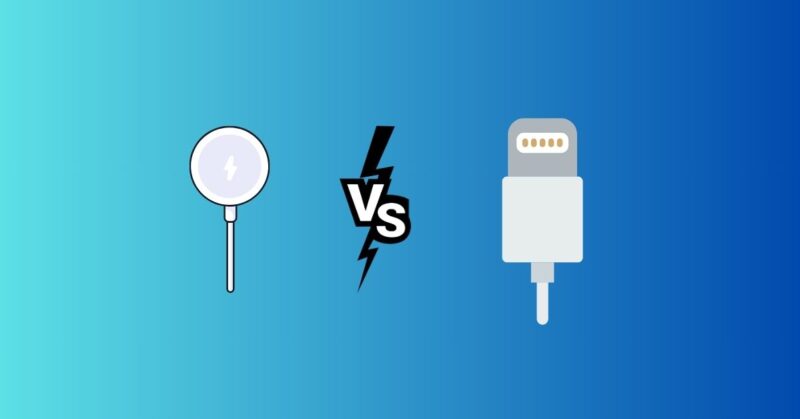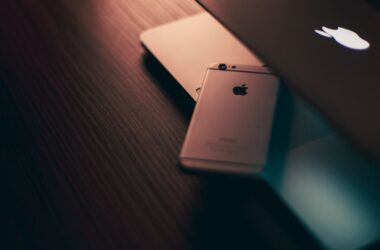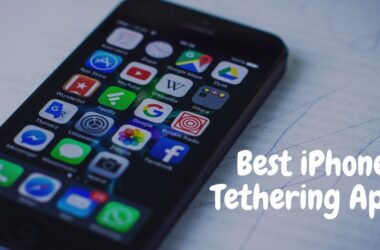Deciding how to charge your iPhone can be a head-scratcher, especially with the MagSafe vs Lightning options. When it comes to charging your iPhone, the choice between MagSafe and Lightning cables is like standing at a crossroads, isn’t it?
Note: If you are getting an iPhone 15, then a MagSafe charger is the option for you.
MagSafe Vs Lightning: Which One is Better?
The MagSafe Vs Lightning Comparison isn’t just about charging your iPhone, it’s about finding the perfect match for your iPhone’s power needs.
So, let’s break it down and figure out which one stands out. Are you Team MagSafe or Team Lightning?
How Much Power Does a Lightning Charger Deliver?
An iPhone Official Power adapter delivers 20W of power using its fast charging feature.
However, some of the third-party certified iPhone chargers can deliver up to 30W of power on fast charging, One such fast charger is Belkin Charger.
There are some chargers that can deliver up to 40W, however, it doesn’t mean that they will charge your iPhone faster. The operating system and hardware are designed to use only a maximum supported power to charge the battery.
If you are an iPhone 11 user, your device will use a maximum of 22.5W of power while charging, only the iPhones 14 Pro / Pro Max and later series can use up to 27W of power.
How Much Power Does a MagSafe Charger Deliver?
A MagSafe Charger can deliver a maximum power of 15 watts, using 9 volts. However, it’s important to note that the limitation of the MagSafe Cable is that you must use a power adapter with an output of 9 volts.
In this case, using a Lightning cable to charge your phone is the faster alternative for you. Starting iPhone 15 Series, Apple has started using Type-C for the iPhone series due to European laws.
Also, choosing a charger solely to speed up your phone charging could be a big mistake.
Choosing the Right Charging Tech: MagSafe Charger Vs Lightning Cable
| Power Delivery | Lightning Charger | MagSafe Charger |
|---|---|---|
| iPhone Official Power Adapter | 20W with 9V and 2.2A | N/A |
| Maximum Power Usage for iPhones | iPhones 11 and later: Up to 22.5W | iPhones 14 Pro and Pro Max: Up to 27W |
| MagSafe Charger | N/A | 15W with 9V |
| Compatibility | Requires 9V output | Requires 9V output |
| Charging Speed Consideration | Using a Lightning charger may be faster, especially with newer adapters | Choosing a charger solely for speed may not be the best criterion |
| Heat Management | May generate more heat during charging | Reduced heat production during charging |
| Future-Proofing | Accessories may remain usable with future iPhones | Lightning Port Removal in iPhone 15 Series |
Now, let us discuss the benefits of using Lightning Cable and MagSafe Charger. What you should use and why?
A Lightning Charger or A MagSafe Charger?
From my point of view, using a Lightning Cable seems a viable option as most of the iPhone users are currently using iPhone 14 Series or older devices,
If your priority is charging your iPhone at maximum speed, the Lightning Cable is the way to go. On the other hand, if you prefer the convenience of effortlessly charging your iPhone without dealing with tangled cables, MagSafe is the ideal choice.
Additionally, with the influence of EU laws, the Lightning cable is becoming obsolete, especially as the iPhone 15 series has already transitioned to Type-C ports. Looking ahead, Apple may even consider removing the charging port entirely from future iPhones. So, Get a MagSafe Charger instead of the Lightning Cable.
Benefits of using Lightning Cable
So, the main advantage of using a Lightning Cable is it allows you to charge your iPhone at its maximum speed.
Another great advantage is, that you can use your iPhone while charging, however, it is not recommended to use it as it heats up your iPhone. Also, it is cheaper to get a long lightning cable when compared to MagSafe.
Benefits of using MagSafe Charger
The primary reason for using MagSafe is not just because it looks cool—though that’s a bonus. It’s also about the ease of placing your iPhone for charging, where it effortlessly connects.
Another important advantage is you will have the charging port available all the time and can be used to connect other accessories while charging your iPhone.
The ultimate showdown on MagSafe vs Lightning, and which charger you should use.
Conclusion
In conclusion, when it comes to MagSafe vs Lightning, both charging technologies have their pros and cons. Personal preferences, charging needs, and device compatibility should all be considered when making a decision. Whether you choose the convenience and versatility of MagSafe or the widespread compatibility of Lightning, it ultimately depends on what suits your individual needs. So, weigh your options wisely and make a choice that empowers your iPhone charging experience. Upgrade your charging setup today!
FAQs
Is MagSafe charging better than Lightning?
Yes, given the current circumstances of Apple shifting to Type-C, it’s better to go for MagSafe Charger.
Is MagSafe better for battery health?
It depends on how users manage their charging practices. However, it uses more watts which might affect your electricity bill.
Can you charge with MagSafe and Lightning at the same time?
As per Apple, your iPhone will charge from Lightning Cable.
Does the MagSafe Charger stop charging at 100%?
Yes, it does stop the charging when your iPhone’s battery level reaches 100%.
Is it better to charge an iPhone with Magsafe or a lightning cable?
To charge your iPhone quickly, go for the Lightning Cable. If you want easy, tangle-free charging, MagSafe is your go-to choice.








